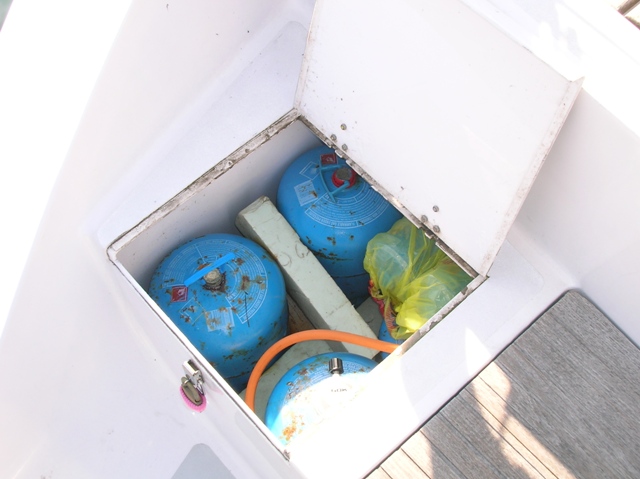|

| |
On top of food and fuel, there are other consumables to be taken into
account: are they available around the world, or do we need to carry a
sufficient supply from home?
GAS: most Rally boats used gas for cooking, accepting the problem of having
to refill them in odd places around the world.
In fact, there are two different gasses, propane and buthane, which would
require different bottles and different regulators, but the truth is, you will
almost never find out what sort of gas is available (in most cases, it's
actually a mixture) so after a while we stopped worrying...
Another problem is with the bottles' threads, of which there are a gazillion
different ones, and the refilling stations may not be able (or willing...) to
fit yours.
We choose to leave with four 2.8 Kg. bottles, two standard Camping Gaz and two
italian-threaded camper bottles, and we always managed to fill either one type
or the other, depending on the country, although very seldom we could fill both
types, therefore cutting our reserve from 4 down to 2 months of use (admittedly,
our cooking was rather limited, also in view of the hot climate and the cook's
unwillingness to stand in front of a heat source!)
We had an emergency camping-style cooker which was running on the same
throw-away gas cartridges as our BBQ, but we never had to resort to it.
A special problem is in Australia, where they forbid refilling bottles other
than those with an australian type-approval stamp, so we had no other option
than to buy a small local bottle, which we could then easily refill at most car
fuelling stations.
A word of warning: gas bottles rust very rapidly! We had to brush them clean
and repaint them several times, and by the end of the voyage they were good fro
scrapping.
Two strict rules: keep the gas bottles in a ventilated locker with no access
to the boat's interior, and keep them closed all the time when not in use! No
exceptions allowed!!

The gas-bottle locker at the stern of Shaula3
ENGINE OIL AND FILTERS: engine oil is easy to get, as it is the same as for
vehicles, but it is advisable to carry at least enough to perform a full oil
change plus few refills.
The inverter's oil may be a little less easy to find (ours was a car's
automatic-drive oil), so we always kept enough for at least two or three changes
(it's a small quantity anyway).
Definitely much less easy to get are the engine's oil- and fuel-filters, which
normally get replaced at every oil change, but could be replaced also during
engine troubleshooting routines (e.g. due to dirty fuel): never run short of
them, as you don't know when you will be able to buy them next time.
WATERMAKER FILTERS AND CLEANING PRODUCTS: this is highly specialised stuff,
nearly impossible to find, carry it from home!
SPARES: according to Murphy's Law, if something can break, it will (at the
worst possible moment...)!!
Even in countries where nautical stuff can be found, chances are that the
locally-popular makes could be different from back home (in the Pacific, jou'll
find mostly japanese brands, for example). Expecially electronics, even top-name
brands, may be very hard to find. Generally you can have
parts shipped, but this may take a long time; actually some Rally boats had to drop off
because they were unable to complete serious repairs in time!
Anyway, unless you decide to tow a second, spare boat, sooner or later you will
need to look for:
SHIP-CHANDLERS:
Surprisingly rare, and often not well-stocked. Generally they can order stuff
for you, but deliveries can be very slow and unreliable.
- GIBRALTAR: surprisingly poorly-stocked. Mainly british stuff.
- CANARIES: few shops, hard to find and not very well stocked.
- CARIBBEAN: some good and well-stocked shops: in Antigua they have mainly US products
(expensive),
while in Guadaloupe and Martinique, mainly French stuff.
- PANAMA: another surprise, there is almost nothing, although they can order
from the USA with delivery in few days. In Panama City there is a good retailer
of nautical charts and pilot books, a rarity!
- GALAPAGOS: there's a reasonably well-stocked shipchandler in Puerto Ayora,
Isla Santa Cruz
- TAHITI and RAIATEA: shipyards, and some passably well-stocked, french-product oriented chandlers.
- FIJI: shipyard and chandlery are available at Vuda Point Marina, on Viti Levu
island
- AUSTRALIA: in the small towns we visited, despite the marinas, shipchandlers
were few and not well-stocked, but they can order everything for delivery in
just one or two days.
- SINGAPORE: marinas with shipyard capabilities, but surprisingly little in the
way of chandlery, expecially electronic equipment, while general electronics are
plentiful at bargain prices.
- MALAYSIA: some technical support, but very little in the way of equipment,
other than by special order. In downtown-Langkawi there is a print-shop that
sells (illegal...) prints of nautical charts, at a bargain price...
- THAILAND/PHUKET: shipyards, some chandleries, sailmakers, you can find
everything. Make sure your boat is in good shape before leaving, because there
is NOTHING available from here on!
|